Gene Wilder Movies: 22 of His Best Films
- Oops!Something went wrong.Please try again later.
- Oops!Something went wrong.Please try again later.
- Oops!Something went wrong.Please try again later.
- Oops!Something went wrong.Please try again later.
Gene Wilder movies. When you hear that phrase, what comes to mind? Most likely it will be film titles like Willy Wonka and the Chocolate Factory, Blazing Saddles or Young Frankenstein, but the truth is that there are a great many more Gene Wilder movies than those three to choose from. In fact, between 1967's Bonnie and Clyde and 1991's Another You, he starred in 22 of them. And at the center of each of them is the actor, whose humorous and off-kilter portrayals oftentimes come across as a more innocent version of Christopher Walken at his most manic.
"What is it about this neurotic Jewish guy from Milwaukee with all that frizzy hair that hooked me at such an early age?" rhetorically asks Brian Scott Mednick, author of the biography Gene Wilder: Funny and Sad. "Well, I think it was probably a sense of identification. There are few lonely moviegoers out there who don't have at least one actor or actress they feel speaks directly to them. In every character Gene Wilder played, I saw a little bit of me. There is a very fine line between comedy and tragedy, and I can think of no other actor who walked that tightrope better than Gene Wilder."
Take a trip back through the decades — and a world of pure imagination — as we go through Gene Wilder movies, one by one
Bonnie and Clyde (1967)
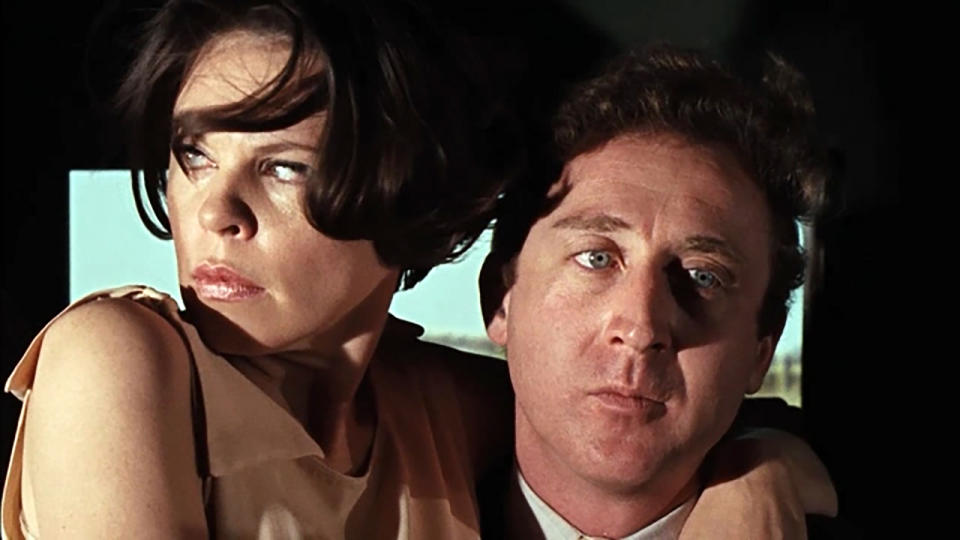
©WarnerBrosDiscovery/IMDb
Gene Wilder movies kicked off with a small part in Bonnie and Clyde as kidnap victim Eugene Grizzard, but the movie really helped to put him in the map — though there was little to suggest the comic performances that were to come. Incidentally, the film starred Faye Dunaway and Warren Beatty as bank robbers Bonnie Parker and Clyde Barrow.
"I was offered a small part in the film," Gene Wilder would reflect as chronicled in the fan made YouTube documentary Gene Wilder In His Own Words. "Director Arthur Penn introduced me to the pretty young woman who would be playing my fiance. Her name was Evans Evans. The first scene started with Evans and me kissing on her porch until I notice that my car is being stolen. We started our rehearsal locked in a big embrace as we kissed and after a few moments, Arthur said, 'Now they're stealing your car, Gene.' I jumped out and said, 'That's my car. Hey!' And that was my introduction to movie acting fun. A little strange to start kissing someone you just met two minutes earlier, but it was fun."
The Producers (1967)
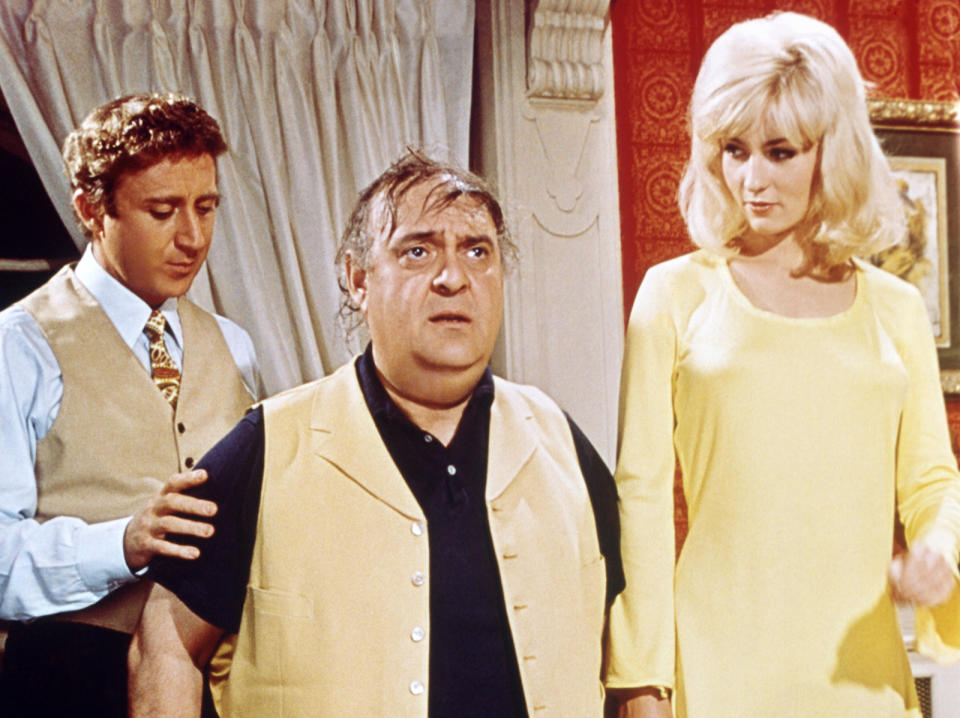
Herbert Dorfman/Corbis via Getty Images
Now this is more like it: Gene and Zero Mostel play a producer and his accountant who come up with a get-rich-quick scheme of creating a musical about Hitler designed to fail that becomes a huge hit. Hey, TV gave us stoopid Nazis in the form of Hogan's Heroes, and The Producers did the same thing on the big screen.
Start the Revolution Without Me (1970)
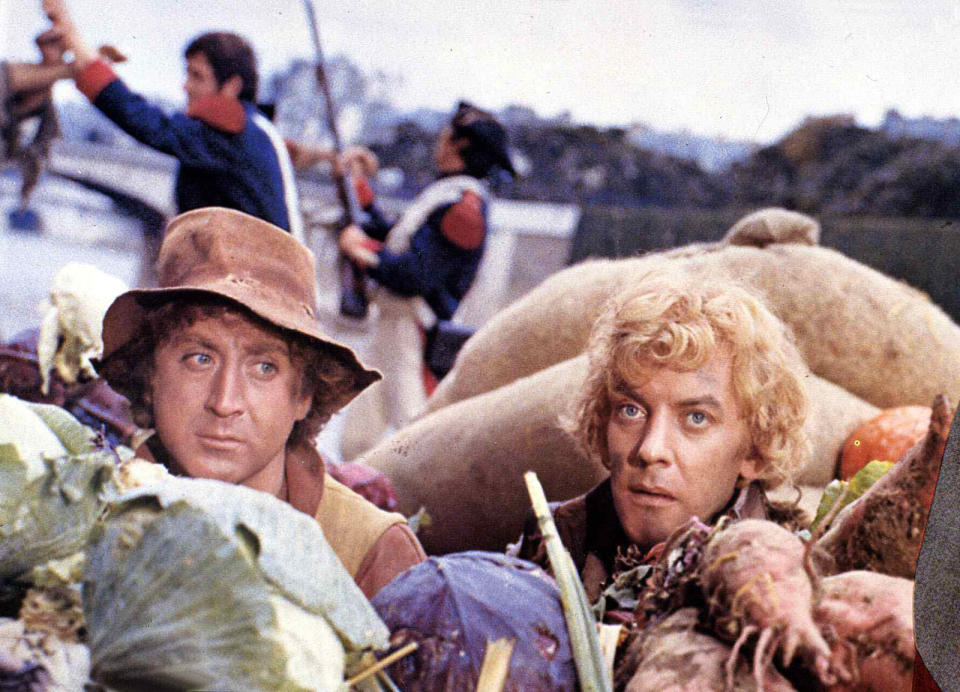
FilmPublicityArchive/United Archives via Getty Images
A parody of a variety of historical fiction novels looking back at the French Revolution, with Gene Wilder and Donald Sutherland portraying a pair of peasants who are mistaken for the famous Corsican Brothers in revolutionary France.
Quackser Fortune Has a Cousin in the Bronx (1970)
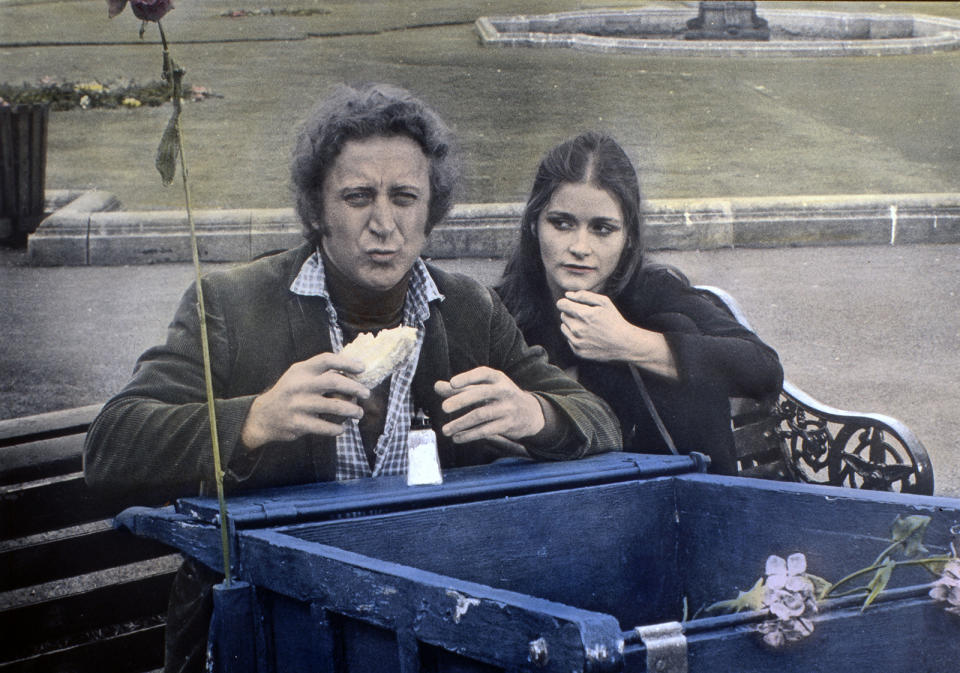
FilmPublicityArchive/United Archives via Getty Images
How's this for a premise: American exchange student Zazel Pierce (Margot Kidder, Lois Lane of the Superman movies) nearly runs over an impoverished Irish manure collector named Aloysius "Quackser" Fortune, who has the natural response: he falls in love with her.
Willy Wonka and the Chocolate Factory (1971)
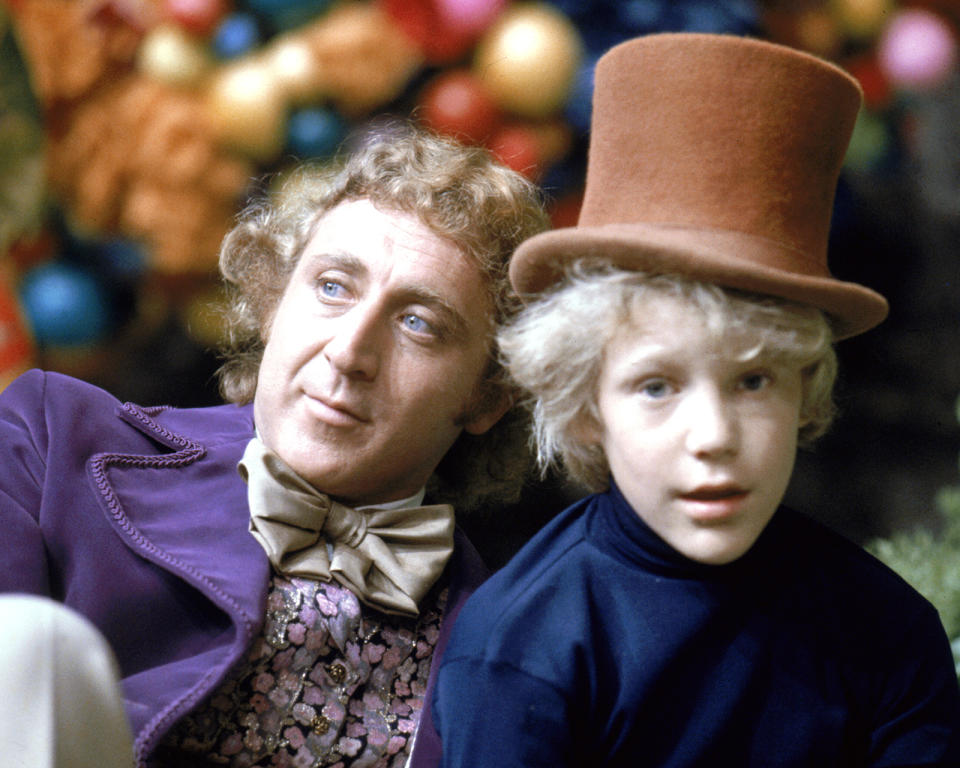
Silver Screen Collection/Getty Images
Of Gene Wilder movies, Willy Wonka and the Chocolate Factory is, without a doubt, his most popular role; a character who puts a group of kids through candy-coated hell to find his successor for the world famous chocolate factory he runs. A beloved classic.
"The script was good," Wilder reflected, "but there was something that was bothering me. Mel Stuart, the man who was going to direct the movie, came to my home to talk about it. 'What's bothering you?' 'When I make my first entrance, I'd like to come out of the door carrying a cane and then walk towards the crowd with a limp. As I walk towards them, my cane sticks into one of the cobblestone I was walking on. i start to fall forward and just before I hit the ground, I jump to my feet.' 'Why do you want to do that?' 'Because from that time on, no one will know if I'm lying or telling the truth.
"Mel Stuart looked a little puzzled," Wilder added. "I knew he wanted to please me, but he wasn't quite sure aobut this change. 'You mean if you can't do what you just said, you won't do the part?' 'That's right,' I answered. He shrugged his shoulders, 'Okay.'''
Menick notes, "He gave an interview once where he said he did not want his gravestone to say, 'Here Lies Willy Wonka,' yet, ironically, he did not have much choice about his legacy."
Everything You Always Wanted to Know About Sex* (*But Were Afraid to Ask) (1972)
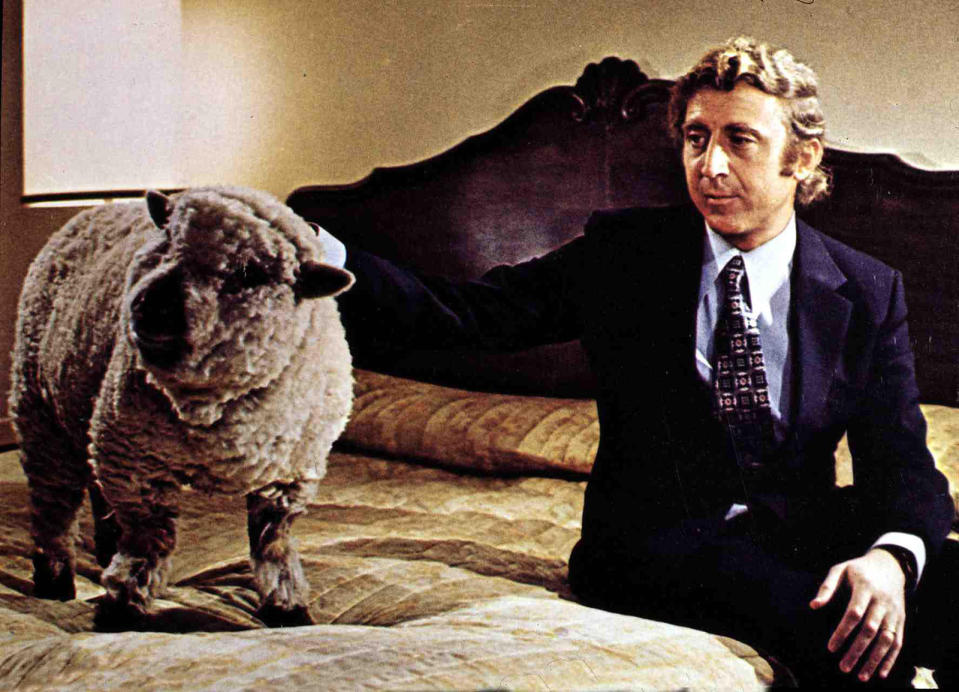
Silver Screen Collection/Getty Images
Based on Dr. David Reuben's book of the same name, and directed by Woody Allen, Everything You Always Wanted to Know About Sex (but Were Afraid to Ask) consists of several short vignettes, Gene Wilder starring in one playing Dr. Ross, who actually falls in love with the partner of one of his patients — a sheep.
Points out Mednick, "It was a good role for Gene at that point in his career, and he always considered that part one of his favorites. I mean, could you picture any other actor in love with a sheep? It was classic Gene."
Rhinoceros (1974)
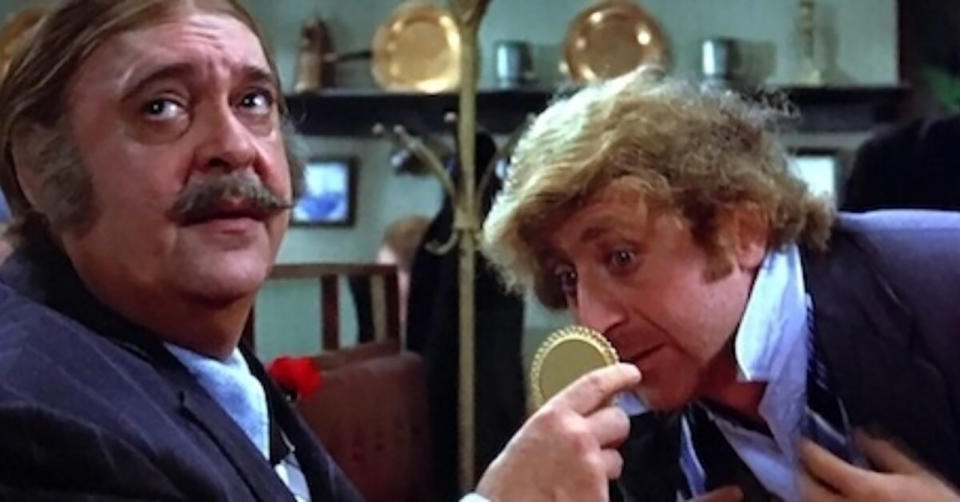
©The American Film Theatre/IMDb
As far as Gene Wilder movies go, this is definitely an odd one as it reteams The Producers' stars, with a film about the people of a town finding themselves turning into rhinoceroses.
Wilder is Stanley, an office clerk who is determined not to change himself, particularly when his best friend, Zero Mostel's John; and his girlfriend Daisy, played by Karen Black, start changing as well. It's all about not conforming to the rest of the "herd," with Stanley trying to hold on to his independence.
Blazing Saddles (1974)
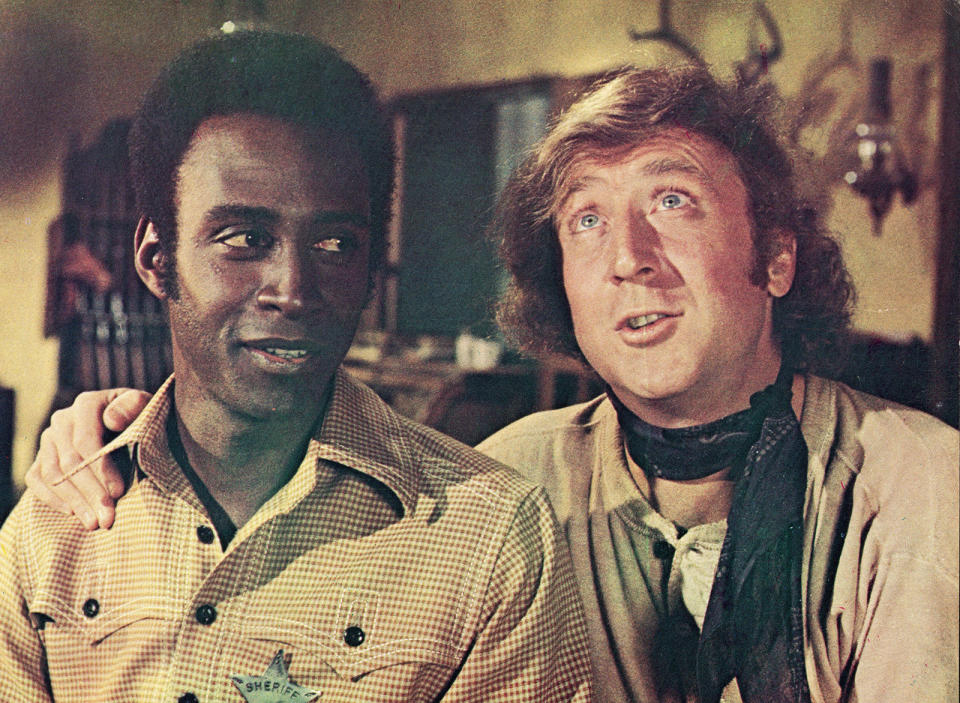
Warner Bros./Courtesy of Getty Images
Mel Brooks' classic parody of Westerns, with Cleavon Little as Bart, a black man made sheriff of the racist Rock Ridge through the machinations of Harvey Korman's Hedley Lamarr. En route, he encounters Jim, better known as "The Waco Kid" (the fastest gun in the west until some kid shot him in the butt and he gave it all up), and together they decide to clean up this town. Puns, visual jokes and the kind of humor no filmmaker would get away with today.
As Gene Wilder related to Newsday of playing the Waco Kid, "I got into my boots and cowboy hat and hung upside down, and didn't expect anything to come of the part. Turns out I got credit for a fast draw that's known worldwide, even though I didn't draw at all. I just sat there and changed the position of my arm."
The Little Prince (1974)
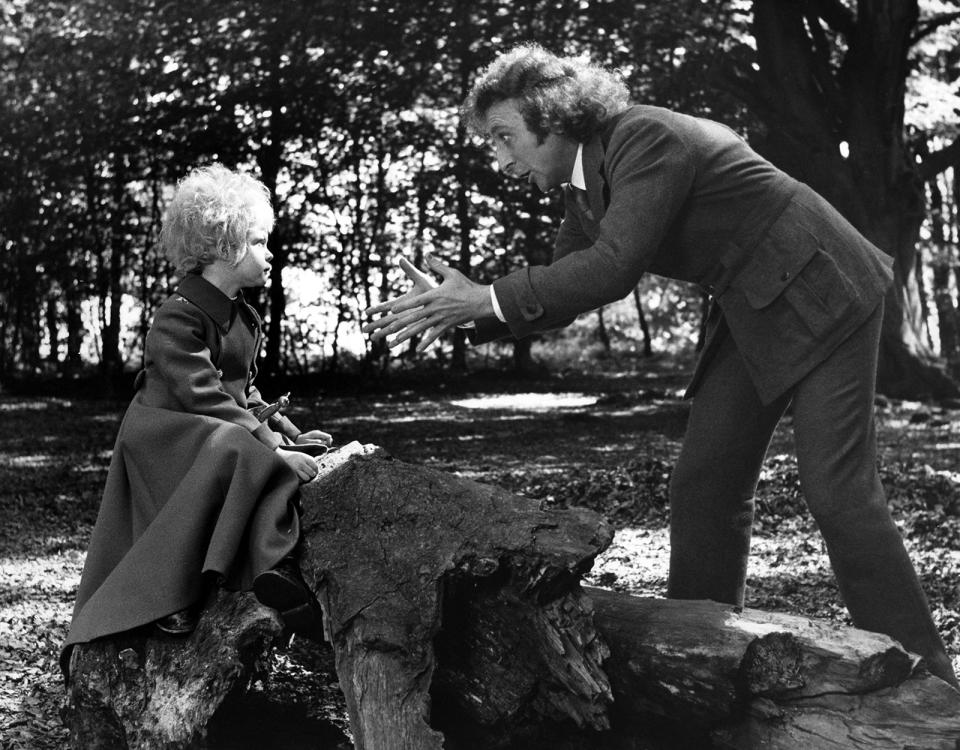
Keith Hamshere/Getty Images
Based on the 1943 book of the same name, this one deals with a pilot (Richard Kiley), who makes an emergency landing in the Sahara Desert. There he encounters a young boy who identifies himself as the Little Prince (Steven Warner), who claims to have come from "Asteroid B-612," and proceeds to tell him about his adventures in the stars. Wilder plays a character named "The Fox."
Young Frankenstein (1974)
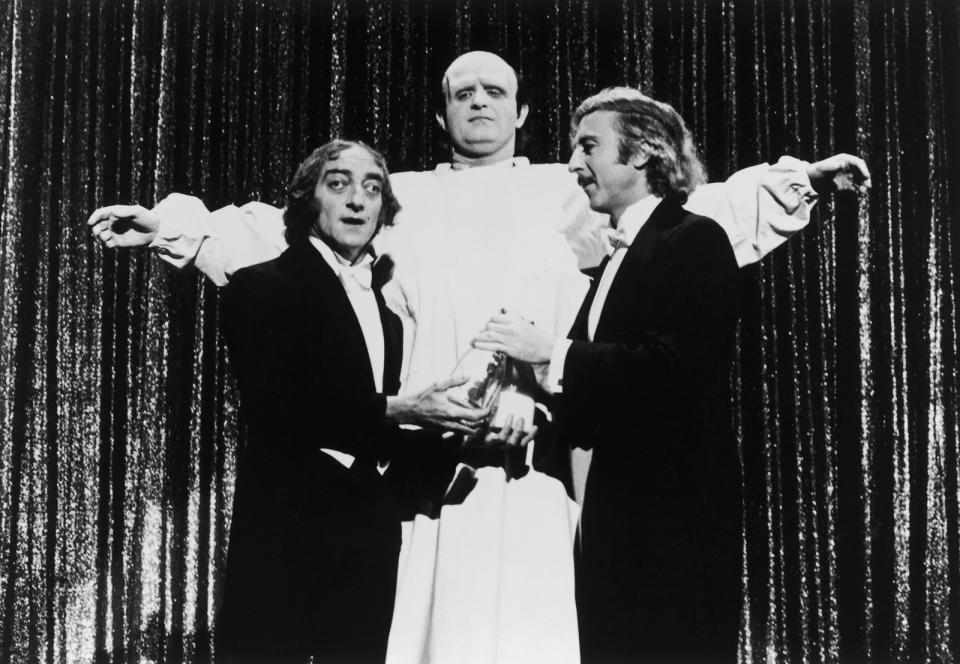
©20th Century Fox/courtesy MovieStillsDB.com
What Mel Brooks did with Westerns, he does to the old Universal horror movies in general and Frankenstein flicks in particular. Wilder is the descendant of Victor von Frankenstein, continuing the man's experiments to bring life to lifelessness, and, thanks to the help of assistants Igor (Marty Feldman) and Inga (Teri Garr), he's successful. The result? Everybody Loves Raymond's Peter Boyle as The Monster! A brilliant comedy from beginning to end, co-written by Wilder and Brooks, with the latter directing.
Gene Wilder told NPR, "When I was a little boy, I was scared to death of the Frankenstein films, and all these years later, I wanted it to come out with a happy ending. I think it was my fear of those movies when I was 8 and 9 and 10 years old that made me want to write that story."

©20th Century Fox/courtesy MovieStillsDB.com
Notes Mednick, "The three films that Gene and Mel Brooks made together really are a comic trifecta, and always will be considered among the very funniest films ever made. Mel maintains that The Producers 'would have been a very good comedy with Zero Mostel and another comic ... but Gene Wilder made it a classic.' Gene once said when asked in the '70s if meeting Mel Brooks was a significant event in his life, 'Would you ask Moses if God bestowing the Ten Commandments upon him was a pivotal event?' So obviously meeting Mel was both life and career changing."
The Adventure of Sherlock Holmes' Smarter Brother (1975)
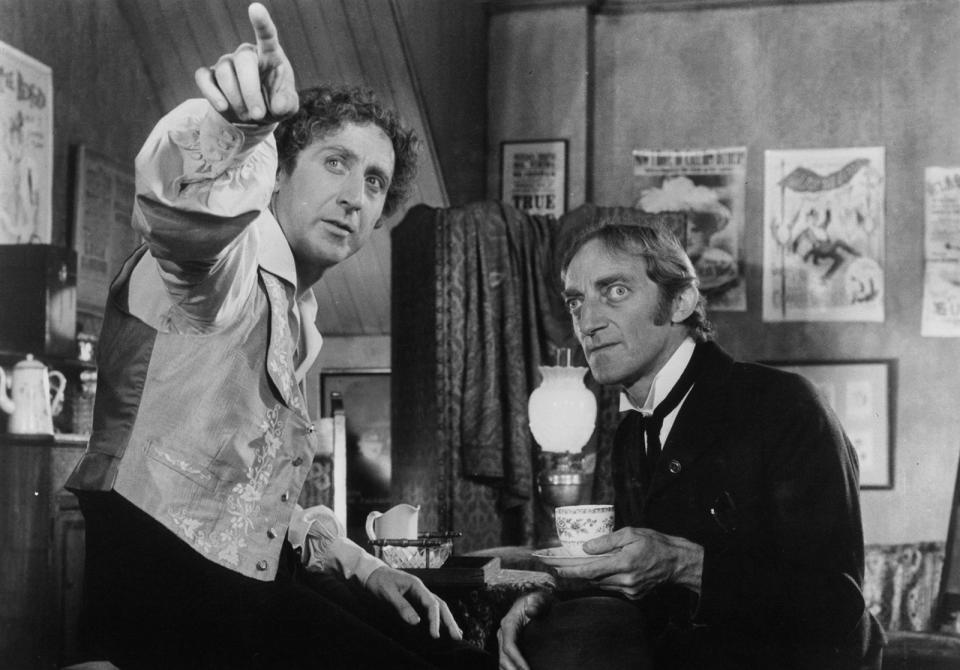
20th Century-Fox/Getty Images
Serving as writer and director, Gene Wilder plays Sigerson Holmes, younger brother to you know who, who has something to prove. Teaming up with Orville Sacker (Marty Feldman) and an aspiring opera singer named Jenny Hill (Madeline Kahn), he sets out to solve the case of missing government documents, the belief being they were taken by Professor Moriarty (Leo McKern). All of this while Sherlock Holmes and Dr. Watson are on assignment in Europe.
Wilder claimed that he ended up directing almost by default. "I couldn't get Mel [Brooks] or anyone like him to direct it," he offered in explanation. "The studio asked me to after we both realized that if Mel couldn't do it, who do you get that can do insane humor, bizarre, crazy, but realistic? Maybe two or three others, and they weren't available. So if someone's going to screw it up, let it be me. I could ruin it just as well as anyone else can. Even better."
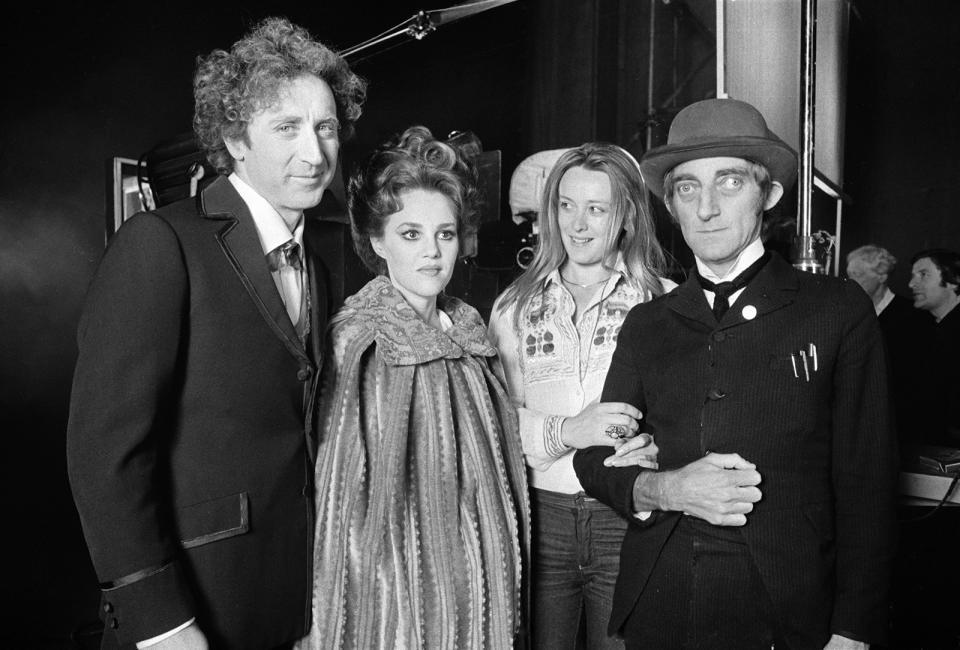
Evening Standard/Hulton Archive/Getty Images
But what really launched the project was the experience of making Young Frankenstein, which led Wilder to ask both Madeline Kahn and Marty Feldman to be a part of it. "I told [them] that I had an idea for a romantic comedy with music about a brother of Sherlock Holmes," Wilder says in the aforementioned YouTube documentary. "I wanted to write parts for both of them, but I didn't want to start writing unless they both wanted to do it. When they said yes, I started writing it."
Silver Streak (1976)
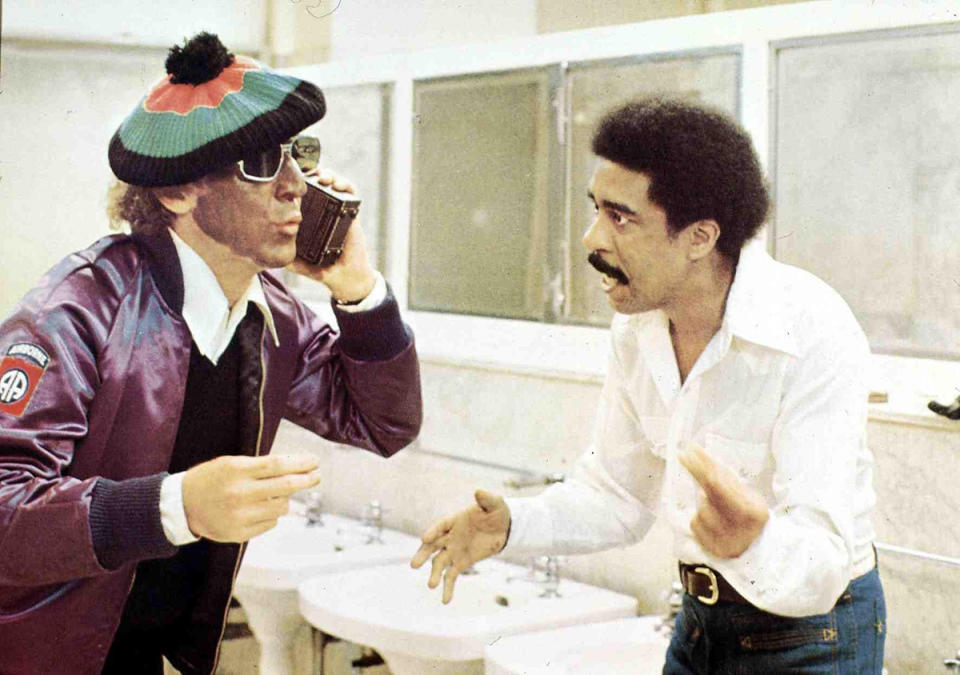
©20th Century Fox/courtesy MovieStillsDB.com
Gene Wilder is George Caldwell and Richard Pryor is Grover T. Muldoon, a pair of men who meet on a Los Angeles-to-Chicago train called the Silver Streak, on board of which a murder has taken place. What follow is a comedic whodunnit. One of the really great pairings showcased in Gene Wilder movies.
Recalled Gene Wilder, "I met Richard Pryor for the first time in Canada. A very quiet, modest meeting. We gave each other a hug, he said how much he admired me, I said how much I admired him and we started working the next morning and we hit it off really well. And he taught me how to improvise on camera."
Adds Mednick, "Even though Pryor worked on the screenplay for Blazing Saddles, he and Gene did not meet until shortly before filming their first scene in Silver Streak. They got along well and found they had an innate comedic chemistry, but they were not friends off screen. The film was a big hit, but Pryor resented doing it; he thought he was brought in just because the filmmakers wanted to fend off criticism from blacks, which was ridiculous. Pryor was incredibly sensitive and paranoid."
The World's Greatest Lover (1977)
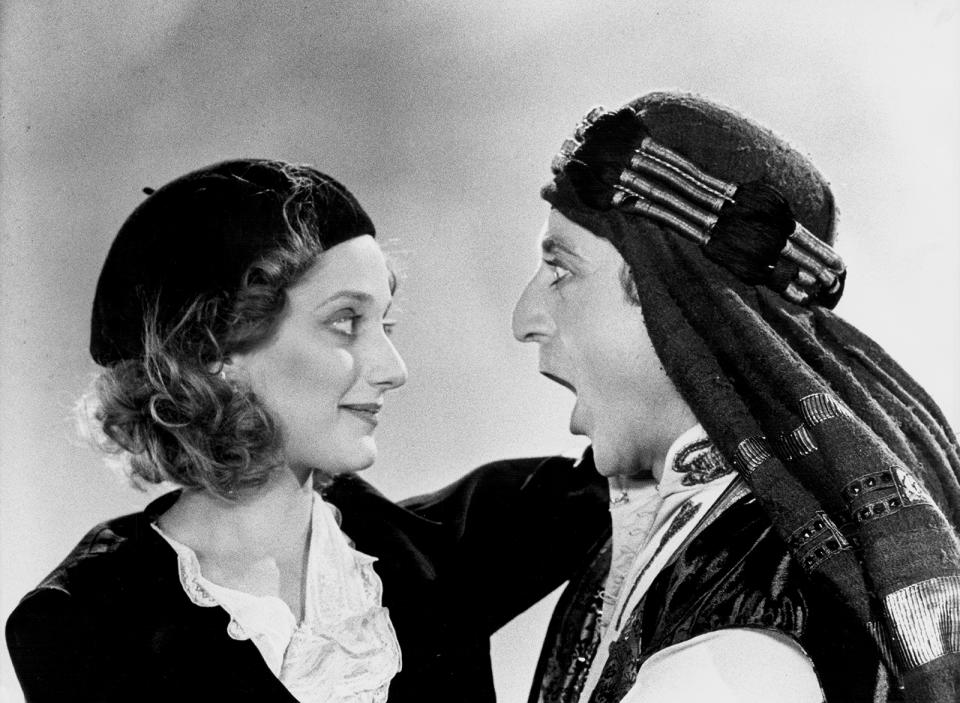
Stanley Bielecki Movie Collection/Getty Images
Neurotic Milwaukee baker Rudy Hickman (Gene Wilder) dreams of breaking into Hollywood during the silent era and he decides to enter a competition to become the next Rudolph Valentino. What the film actually is, is a spoof of old movies. Also starring is Carol Kane as Rudy's wife, Annie; and Dom DeLuise as studio head Adolph Zitz.
The Frisco Kid (1979)
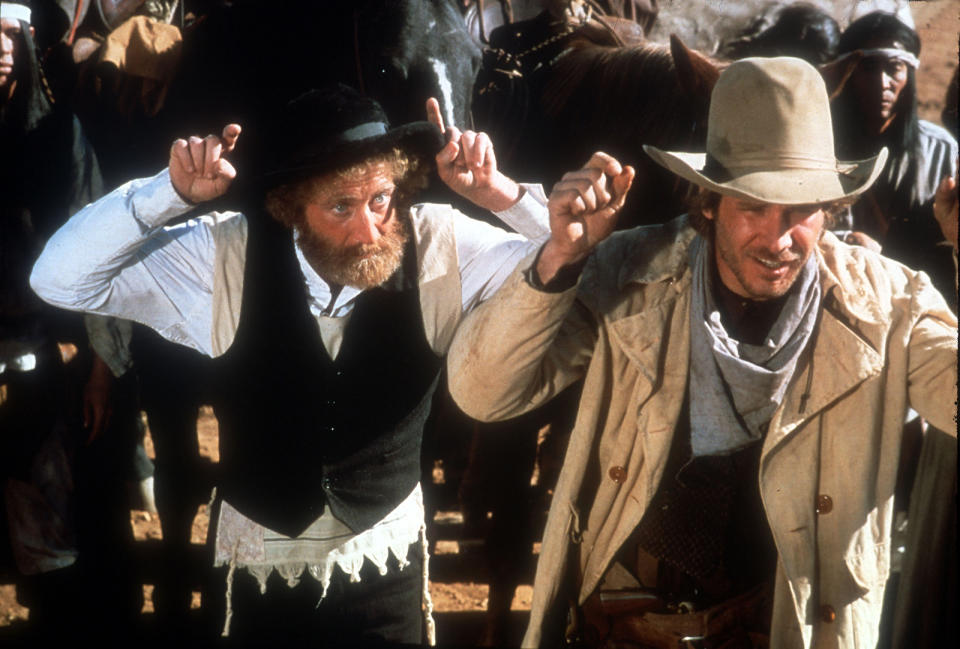
©WarnerBrosDiscovery/courtesy MovieStillsDB.com
Avram (Gene Wilder) is a Polish rabbi making his way through the Old West on the way to San Francisco where he is to lead a synagogue. Unfortunately, early on in his journey he is ripped off of most of his possessions by a group of conmen and nearly burned at the stake by Native Americans. Helping him — though it's not clear how helpful he's really being — is cowboy Tommy Lillard (Harrison Ford).
Sunday Lovers (1980)
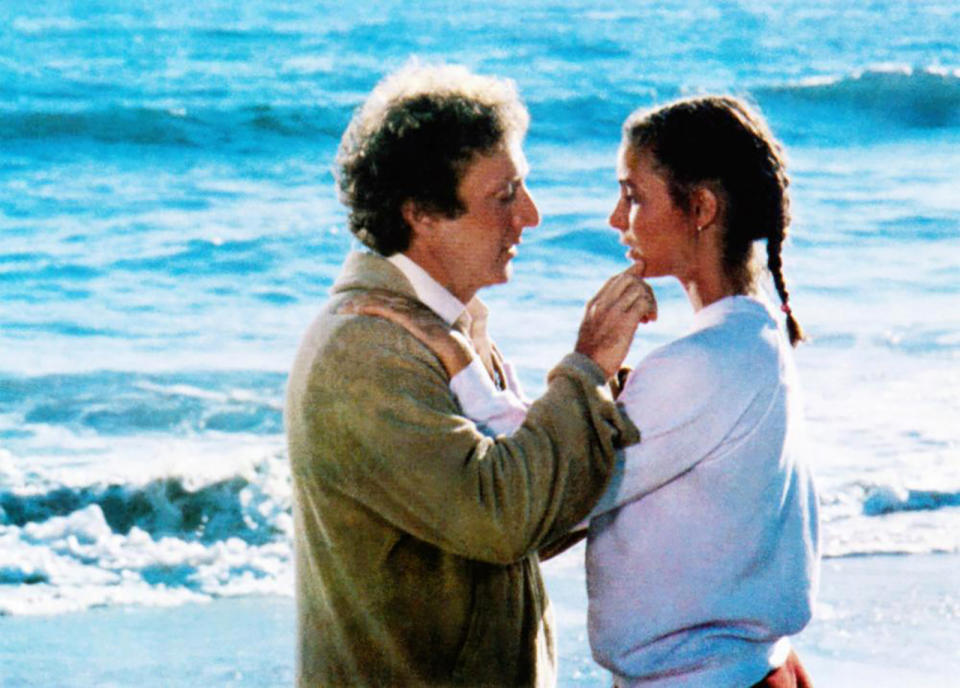
©MGM/IMDb
Gene Wilder is one of the stars in this sex comedy anthology film that features four stories, one each from England, France, America and Italy. Gene's segment is titled "Skippy" and co-stars Kathleen Quinlan.
Stir Crazy (1980)
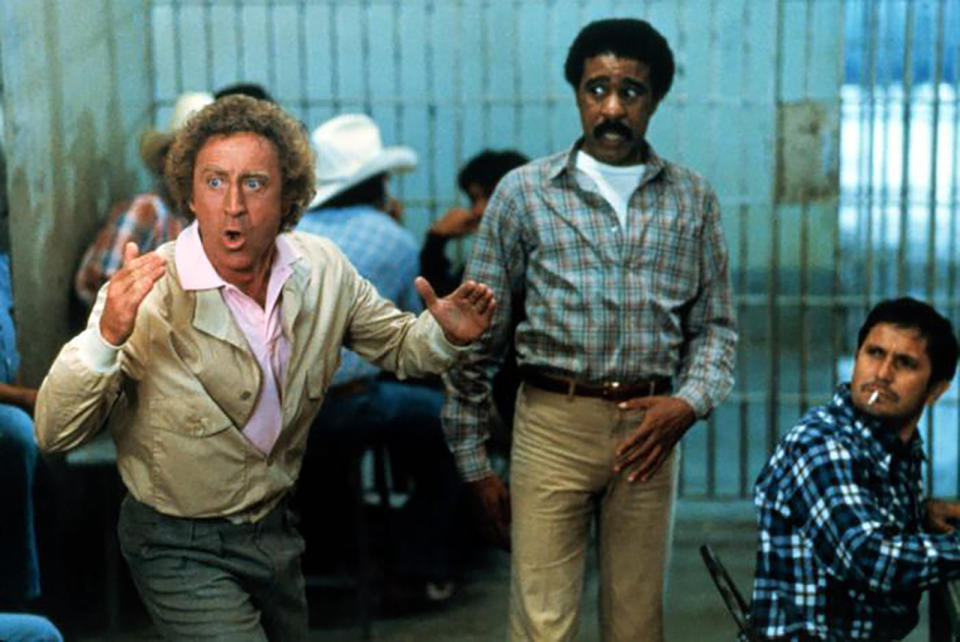
©Columbia Pictures/courtesy MovieStillsDB.com
Gene Wilder movies start a trend here as he reunites with Richard Pryor in this film as a pair of unemployed friends who find themselves framed for a bank robbery and are given 125-year sentences. A series of wild situations leads to them attempting to clear their names.
"When Gene and Pryor did Stir Crazy," says Mednick, "they again got along, but they rarely socialized off the set. Pryor's drug use was so rampant that he often showed up late on the set — sometimes half a day late — which infuriated the crew. He delayed production to the point where the film's $10 million budget ballooned ato $15 million. At one point, Sidney Poitier, who was directing, met with studio executives to talk about replacing Pryor with another actor and reshooting his earlier scenes, but Pryor ended up returning to finish the picture."
Hanky Panky (1982)
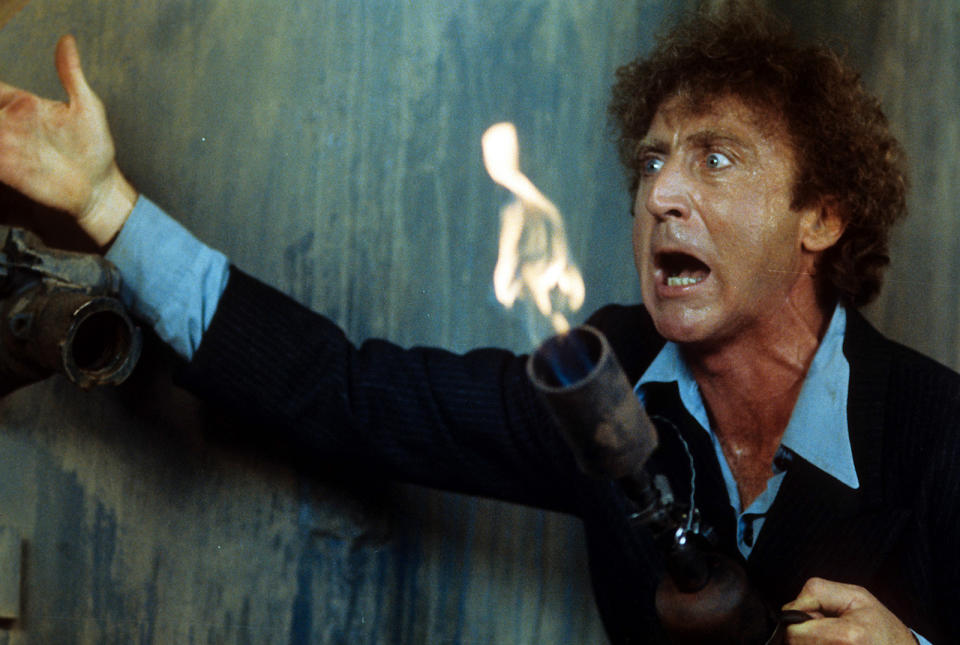
Columbia Pictures/Getty Images
It's a murder comedy mystery with Gene Wilder as architect Michael Jordon and Gilda Radner (who was Gene's wife) as the mysterious Kate Hellman, who he suspects is the murderer, while she thinks the same of him. Interestingly, this film was originally designed as a sequel to Stir Crazy, but when Richard Pryor wasn't available, the screenplay was rewritten.
The Woman in Red (1984)
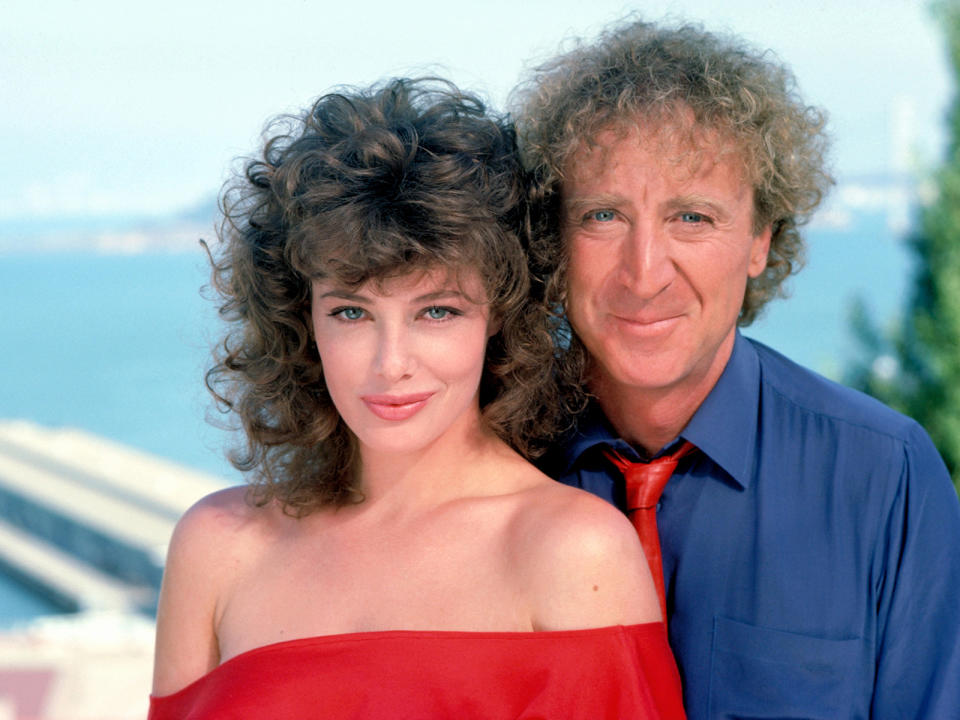
©Orion Pictures/courtesy MovieStillsDB.com
Based on the French film Pardon Mon Affaire, this film focuses on a married man (Gene Wilder) who becomes infatured with another woman (Kelly LeBrock) and his humorous — and increasingly. more desperate — attempts to meet her in the hopes of intimacy.
"I was intrigued with the story of an innocent guy who gets in trouble way over his head and becomes obsessed with having one woman," Wilder told the British media at the time. "And I can't think straight until I have her. In the original French version of this movie, they dwelt a lot on four characters throughout their lives. I just stayed with this one story."
Haunted Honeymoon (1986)
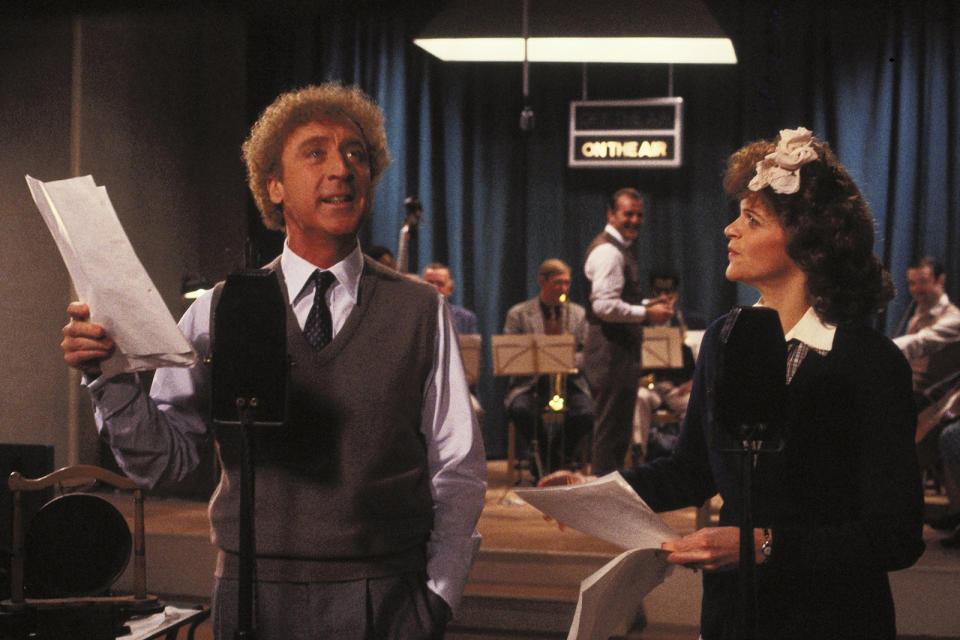
©Orion Pictures/courtesy MovieStillsDB.com
Radio mystery show hosts Larry Abbot (Gene Wilder) and Vickie Pearle (Gilda Radner) have announced their engagement, which has resulted in Larry developing speech problems. When a doctor says he can cure him — though it requires him being scared practically to death — he returns to the mansion that was his boyhood home. There, strange things begin to take place that have nothing to do with the cure.
"Since I was 6-years-old I have been scared of horror movies," Wilder told the Philadelphia Inquirer. "And the movies that I liked the best — even though I was scared by them — were what was called then 'comedy-chillers.' They were horror movies yet they had comedy, or they were comedies and they had horror. They were not comedy-mysteries, they were not comedy-thrillers, they were comedy-chillers. When I started writing Haunted Honeymoon, I knew I wanted it to be a comedy-chiller, but I struggled and the film ended up being an autobiographical psycho/sexual comedy with music.:"
See No Evil, Hear No Evil (1989)
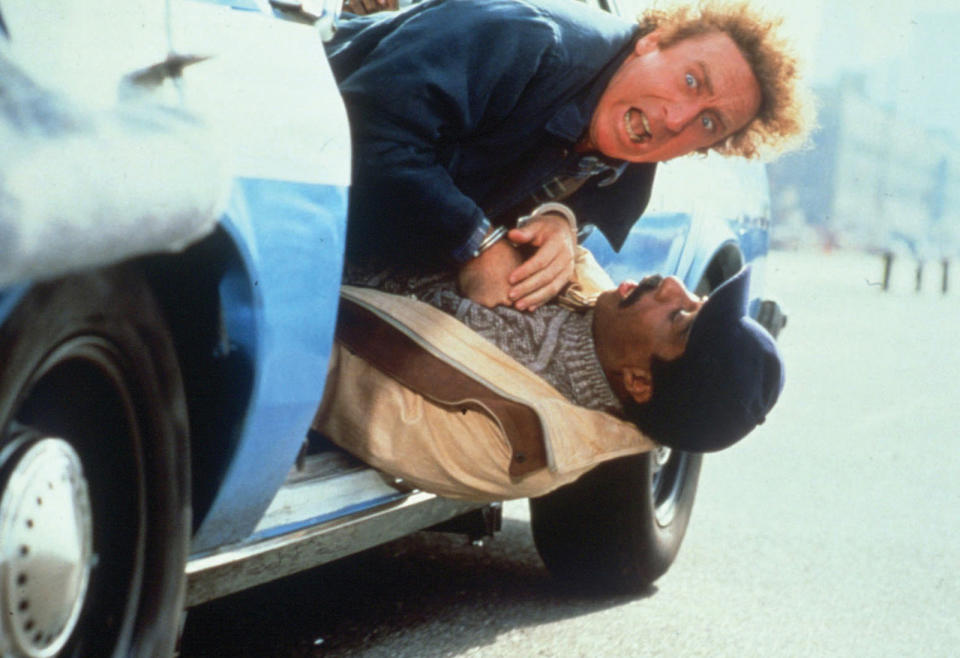
©TriStar Pictures/courtesy MovieStillsDB.com
In this comedy thriller, Richard Pryor is the blind Wally Karew while Gene Wilder is the deaf David Lyons, and together, despite their handicaps, they attempt to take on a trio of thieves who won't let a little thing like murder stop them.
Mednick points out that in the nearly 10 years since they'd last teamed up on film, Wilder and Pryor were both very different people. Pryor had gone through his fifth divorce and began having health problems that led to rumors he had AIDS (later diagnosed as multiple sclerosis). For his part, Wilder was dealing with the cancer battle of then-wife Gilda Radner, which resulted in a far more mellow attitude from both of them during production.
“They also socialized more, something they did not do on their previous films,” he recalls, “but, once again, despite the outward happiness he displayed during interviews for See No Evil, Hear No Evil, Pryor did not think much of it. He referred to the film as ‘lackluster’ in his autobiography. Having recently been diagnosed with MS, he started to feel the toll of the disease during filming. He admitted his motivation to do the film was not to reunite with Gene so much as it was for financial reasons."
Funny About Love (1990)
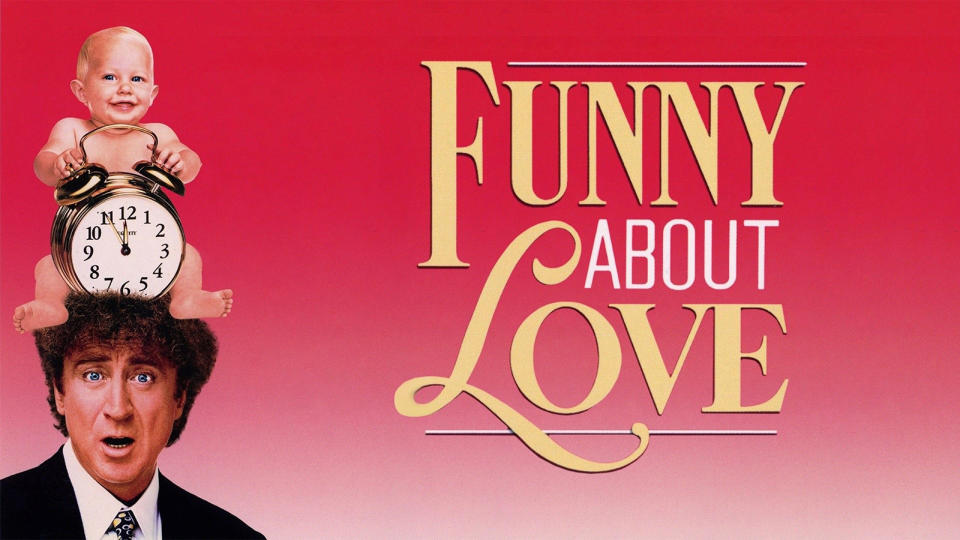
©Paramount Pictures/courtesy MovieStillsDB.com
The trials, tribulations, separation and reconciliation between Duffy Bergman (Gene Wilder) and Meg Lloyd Bergman (Christine Lahti), whose attempts at having a child bring them closer together, but inability to have one tears them apart. It's a romantic comedy, so you can probably figure out what happens. Insofar as Gene Wilder movies go, this one is a little more dramatic than most.
Another You (1991)
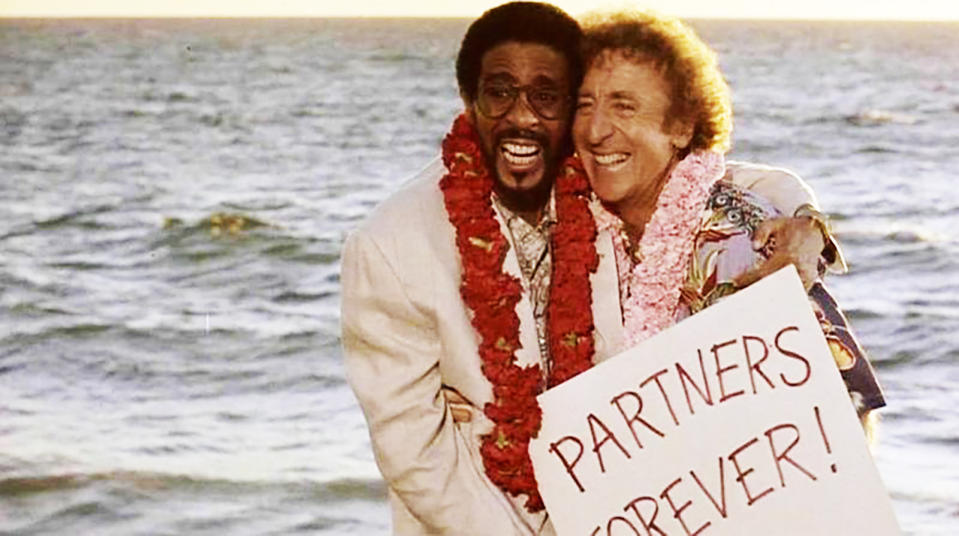
©TriStar Pictures/IMDb
A case of mistaken identity leads conman Eddie Dash (Richard Pryor) to use former mental patient George to take the place of a rich man named Abe Fielding, who has gone missing, to benefit himself financially. This would be Wilder's last film and the final time that Pryor had a leading role in. Sadly, Gene Wilder movies end here.
Opines Mednick, "Had Gene and Pryor stopped doing movies together after See No Evil, Hear No Evil, they would have left a pretty good track record behind, but unfortunately they did a fourth film together, which was a disaster on almost every level."
For more articles you'll love, keep reading…
Mel Brooks Movies and Shows: 27 Surprising Behind-the-Scenes Facts
15 Best Hugh Grant Movies, Ranked: Our Favorite Brit in HIs Greatest Films
Grace Kelly Movies: A Look Back at the Silver Screen Icon's 11 Classic Roles

